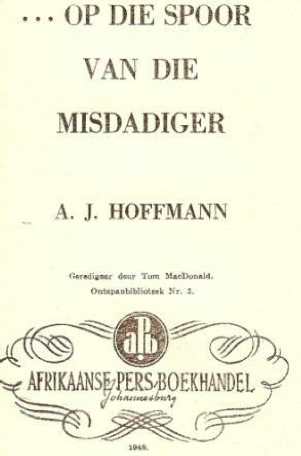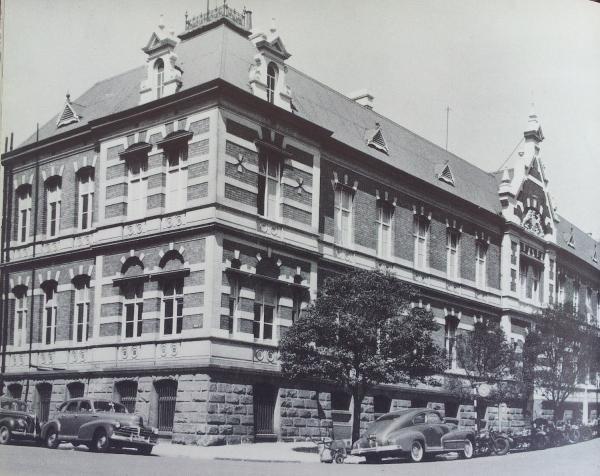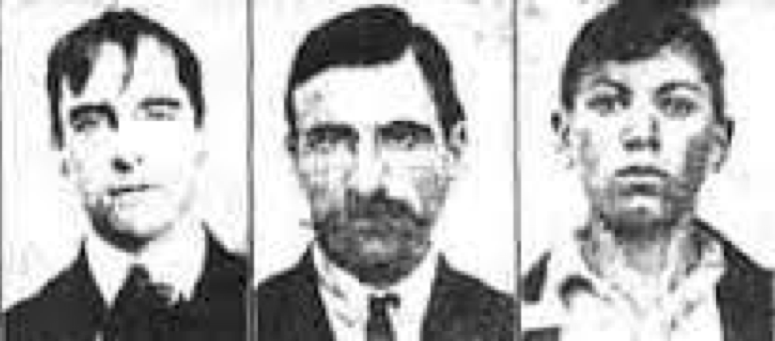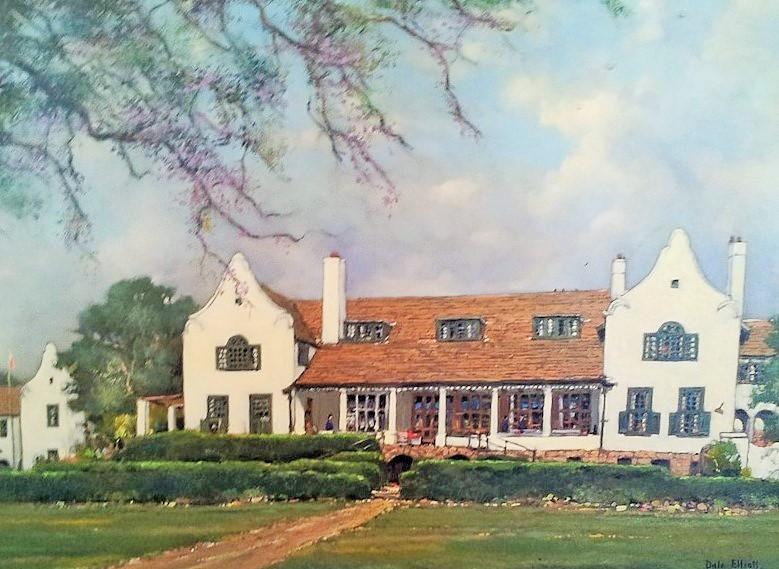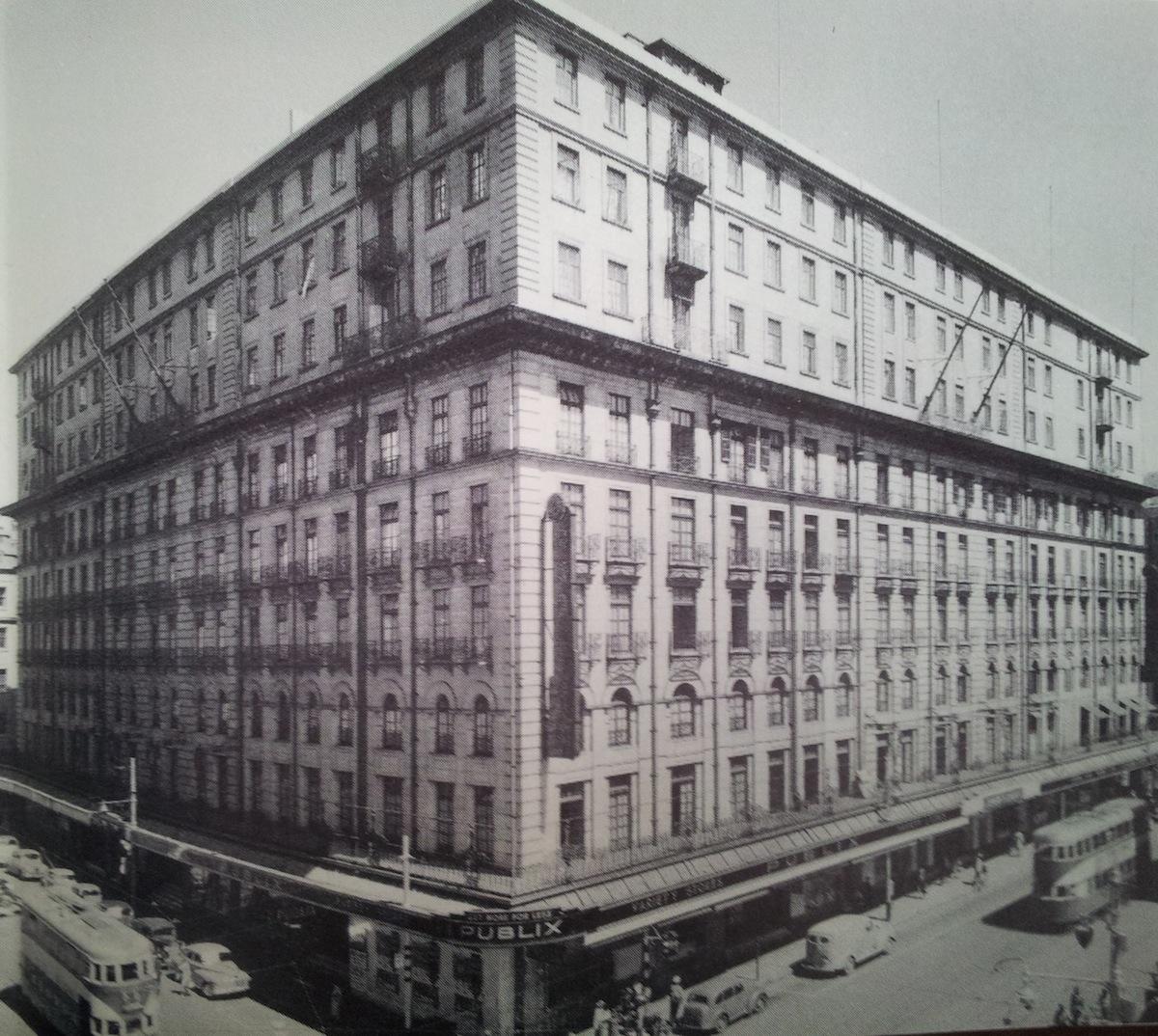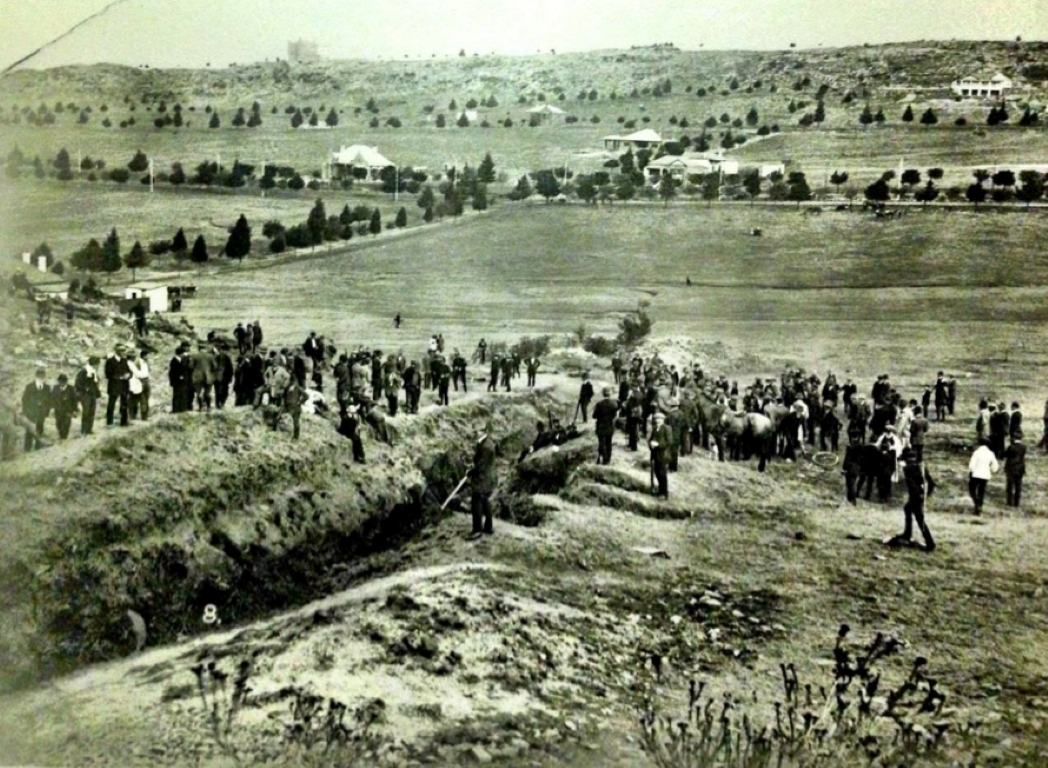
Disclaimer: Any views expressed by individuals and organisations are their own and do not in any way represent the views of The Heritage Portal. If you find any mistakes or historical inaccuracies, please contact the editor.
The story of the Foster Gang is one that continues to grip audiences around South Africa and the world. Below is a remarkable recollection of the saga by A.J. Hoffman, one of the detectives on the case. The piece was translated from Hoffman's book 'Op die Spoor van die Misdadiger' by his grandson Andre. Thank you to the team from Kensington Heritage for sending it through.
Before my mind's eye I see them now; Robert Foster, aka Robert Ward Jackson, the most notorious gang member in the history of South African crime; John Maxim, alias Maxwell, originally an American cowboy and Carl Mezer alias Smith the youngest of the gang and also the worst. I can still see Foster's thin face and his shaggy hair hung in tatters over his narrow forehead as I remember. His eyes were far from one another, and his lips thin and crooked. John Maxim was well built and wide, he was dark with a thick moustache. Carl Mezer was shabby and messy and there was a wild look in his eyes. He always looked a scared and pathetic figure.
As a detective my responsibilities were largely in locating native criminals, I seldom encountered murders committed by whites. But when the Foster gang was in operation, every officer was put on the trail of the bandits. I also had to participate in tracking these criminals.
Robert Foster was a criminal with a long list of misdemeanours. He was serving a long sentence, when he managed to escape from the Pretoria Central Prison. It was 1914 and I was at Marshall Square when the news broke. Instinctively every detective looked for their revolver. Foster was dangerous and we knew that he would be armed and would shoot if he was pushed into a corner. We also knew that he would soon have a gang around him, which would side with him against us. We all knew that we were going to get very little sleep while he was out and on the run.
Marshall Square Police Station (Lost Johannesburg Arnold Benjamin)
We were aware that Foster bragged that he would escape from prison very soon and that when he had escaped and was free, he was going to pay the judge who sentenced him a visit to kill him. Now he had the first step carried out and we knew that he would return to kill the judge as soon as there was an opportunity to do so.
After his escape Foster lay low for a while, there was no sign of him anywhere. But we soon became aware that he was up to his old tricks. Several cases of burglary and theft were reported at stores and behind all the cases we determined that Foster was involved. One night there was a robbery at the Post Office in Vrededorp, they stole cash, large quantities of stamps and postal orders. By that time we knew that John Maxim was also with him. Besides the alias Maxwell, he was also known as the "Yank". He was a very proficient shot with a revolver. There was talk that he originally came to South Africa as part of 'Texas Jack's' gang. He was an excellent rider but it was as shooter that he excelled. He was crazy about shooting with a revolver. If someone threw a penny into the air, he could shoot a hole through the penny. If he did not succeed at such a show, he would walk around sullen and moody for days to come. The biggest insult one could do to him was to speak disrespectfully of his shooting ability.
Carl Mezer, then only 21 years of age, was also with them. He was previously in a juvenile detention facility for boys and was an extremely down trodden individual.
The residents of Johannesburg had their hands in their hair and feared for their lives. It was the month of July 1914, and the outbreak of the First World War threatened, but the rumours of war were insignificant compared to the rumours regarding the Foster gang. I remember the nights were very cold while I was trying to investigate and trace the Foster gang. There were detectives everywhere.
The Foster Gang
On July 17, the gang claimed their first victim. They raided the National Bank in Boksburg North and one man in the bank, Alex Charison, resisted. He was shot dead. Now no one could say where or how the destruction left in their path would end. The largest search South Africa has ever known began. We investigated every report and every rumour but all the leads amounted to nothing more than a dead end.
The weeks slipped past and Foster and his gang were still at large. The war in Europe had already begun. There was much excitement in Johannesburg but Foster and his gang continued to stay in the headlines of the newspapers.
During the night of September 13th, the gang struck again. A constable gave a report through to two sergeants stating that he had seen two suspicious persons in the neighbourhood of the Imperial Bottle Store in Mount Street. The sergeants, Robert Mansfield and Neil McLeod went there and saw Carl Mezer outside the shop, they apprehended Mezer immediately. But Mezer managed to scream as they caught him. Foster and Maxim stormed out of the shop and shot and killed the two sergeants. The constable managed to escape. Foster, Maxim and Mezer then escaped on a motorcycle. Further investigation revealed that Foster and Maxim were in the shop and on the verge of shooting open the safe in the shop when they were interrupted by the sergeants and Mezer's screams. Now the gang had three murders on their list of crimes. Previously, a constable was injured when he prevented them from breaking into a liquor store in Bertrams. He was later picked up in the street.
The search had intensified. As I arrived at the murder scene of the two sergeants on my motorcycle, a native told us that the three men drove off following the Natal Road in the direction of Heidelberg. Detective Kietzman, who was also there on his motorcycle with me, we gave chase after the gang. We were three miles beyond the City Deep mine and again we heard of the gang. At this point other natives told us that the three men had gotten off their motorcycle and ran into the plantations. We tracked the bike markings but there was no sign of them as yet. All day we pursued them following dusty roads and around farmhouses, our search proved to be fruitless. As I look back now I see how risky it was. I only had a small Webley revolver and I doubt Kietzman was armed.
That afternoon we went to Regents Park, where according to information I was given, I would find the Foster Gang in a house there. Upon entering the house we found that it was empty. I'm sure if Foster and his gang were there, I would have been a dead man. At this time the detectives and police did not have weapons as the Government did not issue weapons. We had to make our own arrangements and cover our own needs. Yes if the gang was at home that day, I would not have been here now to write this story. Detective Charles Albert Mynott came across the gang a few days later and he was shot and killed.
Mynott along with another detective were patrolling the area. When Mynott passed by a house and saw Foster and Maxim busy working on a car. He immediately pulled his revolver and shouted: "Hands-up!". A shot was fired and Mynott dropped to the ground. The other detective was at that moment busy in another street. A woman, who saw the shooting, recalled that Foster started the car and Maxim, Mezer and a woman, Mrs. Foster jumped into the car with Foster. The car was driven at speed through the gate and over Mynott's body and sped away towards the East.
The police headquarters had become a beehive of activity. Every available man was mobilised. Heavy trucks full with armed men were loaded up, I was one of them and we then drove along the highway towards Germiston. I can still remember that there was a strong wind blowing and it was bitterly cold on the open truck. But we become even colder inside just thinking about what Foster and his gang could do before they were captured. It was a difficult task and everybody hated them because of their cruelty. We also realised that anyone of us could be the next victim of Foster or the Yank's revolver.
The Police of the Rand warned us to keep our eyes open for a black car that Foster was driving. The order was for each car to stop and if a car failed to stop, the police had to shoot. As a result, and directly linked to this vicious gang, two innocent lives were lost. They were killed as if they were actually shot by the gang themselves. The first victim was Dr. Grace Springs and the second General de la Rey. They were both shot in the same night. General de la Rey with General Beyers was on his way from Pretoria to Potchefstroom travelling to Langlaagte, they were flagged down by the police. They say the car drove without lights and the occupants had total disregard to the orders given. A constable fired at the rear tire, but the bullet hit the hard road and the ricochet entered the back of the car and mortally wounded General de la Rey. I can clearly remember the impression this tragedy had on me and many members of the police as well. Feelings during this period were very tense and there was talk of a rebellion. Later Beyers participated in the rebellion. Would de la Rey also have been involved in it? No one can satisfactorily give an answer to that question. It is certain that General de la Rey was highly respected and loved. He was a man with a strong form and a finely chiseled face, a great warrior. By a whim of fate he had passed away just by the police being on the trail of a gang of killers.
Dr. Grace, a former mayor of Springs, with his wife were also traveling in a black car coming from Johannesburg. He was ordered to stop by the police but he ignored the order. A shot was fired and Dr Grace collapsed on the steering wheel. We attributed this tragedy to the Foster Gang. We were even more determined to catch the gang because the longer they were on the loose and on the run the more chance there was of innocent lives being lost.
We were on their trail and the excitement rose when we found the deserted black car near Bedford, the farm of Sir George Farrar. The police sniffer dogs were brought in and they followed the trail for miles over farmlands but again the gang was gone.
Painting of Bedford House (hanging on site)
Once again we were closing in on them, some school children came to tell us that they saw some men enter a cave on the slope of a mountain. The cave was an excavation made by prospectors. Sergeant Grainer, two white constables and a native constable entered the cave, Sergeant Grainer walked ahead with a flashlight. A short way into the cave he found some burned papers and a little deeper into the cave he found a few more. Then a shot was fired but it missed Sergeant Grainer. He shot back and also missed. Then there was a succession of rapid gun shots. The daredevils just shot blindly. The torch was extinguished and the police retreated in the dark. One constable had a bullet pass through his helmet. The bullet just scraped his scalp; it was only a minor injury.
I will never forget the fuss it created when it became known that the gang was in a cave in the Kensington ‘Koppie’. A large number of police rushed there and many people joined them all to see where the Foster gang was cornered. Day and night there were hundreds of people on the mountain slopes. Yet again the European war seemed very far away, because the catching of the Foster Gang caused a great excitement in the City of Gold, Johannesburg. Eventually the 'Jackals' were trapped, this is how I thought of them. Their opportunity for more robbery and murder was over. They committed cold blooded murder.
Large rocks along the slope were rolled down and completely closed off the entrance to the cave. Now there was no escape route for the 'Jackals'. At night, the entrance to the cave was illuminated with strong lights and armed police were on guard duty while the crowd remained there. There were a lot of curious onlookers that remained there half of the night. You could hear a constant murmur. ‘Would the gang try to come out?’ This question was on everyone’s lips. But they could not escape because they would not be able to move the big rocks that closed off the entrance, cutting them off from the world. Before the rocks were packed in front of the entrance the possibility was there that they could still possibly make a run for it and try and escape. The carnage this would have caused would have been very scary. Slowly but surely, it became clear that the gang's adventures were at an end and they were firmly trapped in the cave.
I stood a short distance away. The deputy commissioner of police was in control. I remember a detective removing a few stones and cupped his hands around his mouth and called out, that they should come out. The challenge echoed in the cave. The answer retorted - 'We will not!'
The detective then asked, 'Is Mrs. Foster, or you may call her Mrs. Jackson with you?'
'No', came the reply, 'It's just us three.'
'Where is Mrs. Foster?'
Foster said, 'She is in Germiston. I want you to send someone to fetch her.' He gave the address where Mrs. Foster was.
The detective then said 'If she comes, we will have to take away the stones. Then we will not tolerate betrayal.'
Foster answered 'Good'.
It was a strange conversation and it made a deep impression on my memory. The whole thing was very strange. Here are the Police Force determined to apprehend the murderers and yet they are willing to accommodate Foster's requests. Foster had promised that if his wife was brought to him, he would hand over the revolvers to her and he and his two companions would walk out and surrender. If you now look back on that agreement that was made between Foster and the Police it surely is extremely strange, since this is the man who sooner or later would have no option but to surrender. How could anyone trust Foster's word as being the truth? This man after all was a murderer. He had shot and killed some of our colleagues and friends. He was a cold-blooded murderer. But Foster insisted he would not discuss surrendering before his wife had been brought to him.
I still remember how a pharmacist offered a few bottles of gas to drive the villains out of the cave, but the offer was turned down. There was no certainty about the nature of the effect this gas would have on them. There was a possibility that this could kill them and we wanted to apprehend them alive. If they lived, they would be charged with murder and sentenced to die at the gallows. The law would condemn them to death but apparently Foster and Maxim had already made a decision to die. I was always of the opinion that it was very unfortunate that Mrs. Foster was brought there because she only came to die.
The crowd was getting very restless and hostile. There was much booing. The people were asking the police if they were playing 'Hide and Seek' and whether they were a shop catering for the wellbeing of the despicable murderers.
When Mrs. Foster asked for a drink, the crowd became very sarcastic. Two bottles of tea were passed into the cave at the end of a long stick on followed by a pack of cigarettes, a cigar and matches.
Someone called out 'Perhaps we will be invited to dinner with them at the Carlton.'
'How much consideration do they, Mansfield, McLeod and Mynott have?' another called out. 'Oh, why do not you and embrace them?'
There was general laughter. I remember how I thought about them, as 'Jackals.' There they are sitting, drinking tea and smoking cigarettes. Maxim would surely smoke the cigar and it would be the last cigar he ever smoked.
Old Carlton Hotel (Lost Johannesburg Arnold Benjamin)
The seconds flew past as they decided to die staging a spectacular death. They must have had a lot of courage because it must be very hard to come to terms with your own death and to face death in the face. What would they be thinking in the darkness of the cave.... the last pull on a cigarette ... the last pull on a cigar ... their last thoughts knowing that this would be their last thoughts?
I listened to some of the spectators talking amongst themselves, hearing them say that Mrs. Foster will never come out of the cave alive. My thoughts had also gone to that direction, I felt sorry, and had compassion for Mrs. Foster, even though I never knew her at all. When this small unassuming woman dressed in black, with her eyes riveted to the ground, escorted by guards arrived, there was an eerie silence. I could feel the terrible tension that prevailed there, and I had a horrible premonition of the probable outcome this would have. Now, after more than thirty years I can still remember the look on her pale face and small mouth. She loved Foster. She came to him, although she knew that her fate was now sealed. I found myself wondering many times over the courage of a woman and I'm sure that little woman had the courage of a lion, since she was prepared to enter the cave where the reckless thugs were waiting.
Many times, that image of how Mrs. Foster stood before the cave, re-lived itself in my memories. At the time I felt that she knew she was going to meet her death and she was willing to do that. She did not hesitate at the entrance to the cave; she just disappeared into the darkness. The silence could be felt, although the crowd was even bigger now. It was bitterly cold ... an icy wind blew and the winter sun was very weak in the blue sky and wide fields lay all around us. In light of the events, after a few minutes of silence, things happened so quickly, I tried imagining what was taking place in the cave after Mrs. Foster had entered into the cave joining the gang. She probably first embraced her husband. Perhaps they had already made a decision to commit suicide in advance, but there is no certainty about this fact. Then the faint sounds of four shots were heard. The police and I stormed into the cave. In the light of torches’, I came across Foster and his wife, dead in each other’s arms. As we continued in the cave, a little ahead of us lay Maxim and Mezer they were closer to the entrance of the cave. Two German Mausers, automatic rapid fire pistols, lay near to the corpses and it was clear that the shooting was done by Maxim. It was also clear that Mezer was afraid to die and he tried to flee, but Maxim shot him, then he shot two more shots, one of which killed Mrs. Foster and the other Foster, killing them in each other’s arms. The last shot was when he shot himself.
It was the singular end of three pitiful lives. I could not help but feel sorry for the woman. I have a slight esteem, maybe not the right word, feeling of awe for the dead men. Mezer’s, death and was reflected in the way he had collapsed in death just as pathetic as his life was. From a young age he had always been directionless, he grew up in bad company and perhaps was never given a chance in life.
His eyes had the look of a wild rabbit. I can well understand here at the end why he tried to flee. He was still very young.
Foster had a heart of stone but there was no doubt that he died bravely. But why did he have to involve his wife in this? This I could not fathom out. Perhaps he thought it would be easier to die with a wife that he loved? This perhaps it a question that only a psychiatrist can give you an answer too. Because of her love for a murderer she died. Maxim... till the very end, he shot his target... His large body lay there, like a broken bag of corn.
As I came out into the sunlight, the chatter of people filled the air.
Frequently during my retirement I would calmly think about Foster and his gang. It was a blessing that the gang was cornered and destroyed. This must be the strangest story in the history of crime in South Africa, and those who took part in the hunt still speak of it. The handful of us that bear witness to the end of this history in the cave, will never forget the feeling. It was a singular tragedy.
Comments will load below. If for any reason none appear click here for some troubleshooting tips. If you would like to post a comment and need instructions click here.

